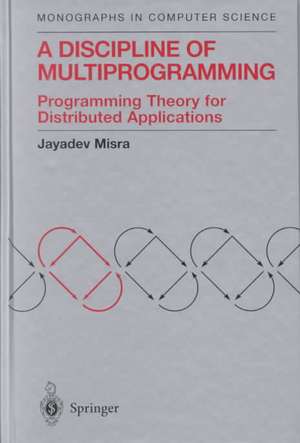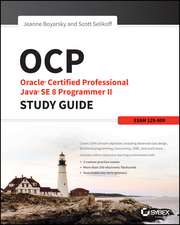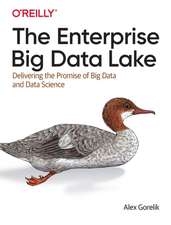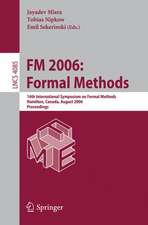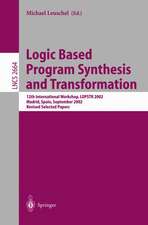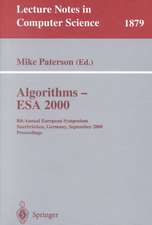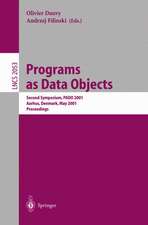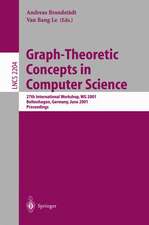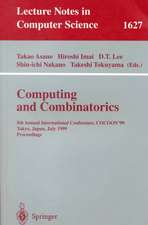A Discipline of Multiprogramming: Programming Theory for Distributed Applications: Monographs in Computer Science
Autor Jayadev Misraen Limba Engleză Hardback – 26 iun 2001
| Toate formatele și edițiile | Preț | Express |
|---|---|---|
| Paperback (1) | 339.66 lei 6-8 săpt. | |
| Springer – 5 sep 2012 | 339.66 lei 6-8 săpt. | |
| Hardback (1) | 343.62 lei 6-8 săpt. | |
| Springer – 26 iun 2001 | 343.62 lei 6-8 săpt. |
Din seria Monographs in Computer Science
- 20%
 Preț: 511.92 lei
Preț: 511.92 lei - 20%
 Preț: 333.22 lei
Preț: 333.22 lei - 20%
 Preț: 1285.31 lei
Preț: 1285.31 lei - 20%
 Preț: 328.60 lei
Preț: 328.60 lei - 15%
 Preț: 646.94 lei
Preț: 646.94 lei - 20%
 Preț: 357.48 lei
Preț: 357.48 lei - 20%
 Preț: 339.47 lei
Preț: 339.47 lei - 20%
 Preț: 653.21 lei
Preț: 653.21 lei - 20%
 Preț: 329.44 lei
Preț: 329.44 lei - 20%
 Preț: 993.74 lei
Preț: 993.74 lei - 20%
 Preț: 992.26 lei
Preț: 992.26 lei - 20%
 Preț: 1630.95 lei
Preț: 1630.95 lei - 20%
 Preț: 656.03 lei
Preț: 656.03 lei - 20%
 Preț: 650.08 lei
Preț: 650.08 lei - 20%
 Preț: 328.09 lei
Preț: 328.09 lei - 20%
 Preț: 641.16 lei
Preț: 641.16 lei - 20%
 Preț: 334.38 lei
Preț: 334.38 lei - 18%
 Preț: 737.74 lei
Preț: 737.74 lei - 20%
 Preț: 642.19 lei
Preț: 642.19 lei - 20%
 Preț: 641.99 lei
Preț: 641.99 lei - 20%
 Preț: 1462.66 lei
Preț: 1462.66 lei - 20%
 Preț: 345.59 lei
Preț: 345.59 lei - 20%
 Preț: 1001.16 lei
Preț: 1001.16 lei - 20%
 Preț: 711.29 lei
Preț: 711.29 lei - 20%
 Preț: 661.47 lei
Preț: 661.47 lei - 20%
 Preț: 343.62 lei
Preț: 343.62 lei - 20%
 Preț: 644.81 lei
Preț: 644.81 lei - 15%
 Preț: 505.30 lei
Preț: 505.30 lei - 20%
 Preț: 640.69 lei
Preț: 640.69 lei -
 Preț: 396.78 lei
Preț: 396.78 lei - 18%
 Preț: 956.81 lei
Preț: 956.81 lei - 20%
 Preț: 592.68 lei
Preț: 592.68 lei - 20%
 Preț: 329.44 lei
Preț: 329.44 lei -
 Preț: 383.33 lei
Preț: 383.33 lei - 20%
 Preț: 349.40 lei
Preț: 349.40 lei - 20%
 Preț: 832.40 lei
Preț: 832.40 lei - 20%
 Preț: 993.42 lei
Preț: 993.42 lei - 15%
 Preț: 578.87 lei
Preț: 578.87 lei - 20%
 Preț: 337.85 lei
Preț: 337.85 lei - 20%
 Preț: 988.16 lei
Preț: 988.16 lei - 20%
 Preț: 996.56 lei
Preț: 996.56 lei - 20%
 Preț: 1293.37 lei
Preț: 1293.37 lei - 20%
 Preț: 1452.94 lei
Preț: 1452.94 lei
Preț: 343.62 lei
Preț vechi: 429.52 lei
-20% Nou
Puncte Express: 515
Preț estimativ în valută:
65.75€ • 68.82$ • 54.73£
65.75€ • 68.82$ • 54.73£
Carte tipărită la comandă
Livrare economică 31 martie-14 aprilie
Preluare comenzi: 021 569.72.76
Specificații
ISBN-13: 9780387952062
ISBN-10: 0387952063
Pagini: 420
Ilustrații: XVIII, 420 p.
Dimensiuni: 155 x 235 x 26 mm
Greutate: 0.73 kg
Ediția:2001
Editura: Springer
Colecția Springer
Seria Monographs in Computer Science
Locul publicării:New York, NY, United States
ISBN-10: 0387952063
Pagini: 420
Ilustrații: XVIII, 420 p.
Dimensiuni: 155 x 235 x 26 mm
Greutate: 0.73 kg
Ediția:2001
Editura: Springer
Colecția Springer
Seria Monographs in Computer Science
Locul publicării:New York, NY, United States
Public țintă
Professional/practitionerCuprins
A Discipline of Multiprogramming.- 1.1 Wide-Area Computing.- 1.2 An Example: Planning a Meeting.- 1.3 Issues in Multiprogram Design.- 1.4 Concluding Remarks.- 1.5 Bibliographic Notes.- 2 Action Systems.- 2.1 An Informal View of Action Systems.- 2.2 Syntax and Semantics of Action Systems.- 2.3 Properties of Action Systems.- 2.4 Examples.- 2.5 Concluding Remarks.- 2.6 Bibliographic Notes.- 3 An Object-Oriented View of Action Systems.- 3.1 Introduction.- 3.2 Seuss Syntax.- 3.3 Seuss Semantics (Operational).- 3.4 Discussion.- 3.5 Concluding Remarks.- 3.6 Bibliographic Notes.- 4 Small Examples.- 4.1 Channels.- 4.2 A Simple Database.- 4.3 Management of Multilevel Memory: Lazy Caching.- 4.4 Real-Time Controller; Discrete-Event Simulation.- 4.5 Example of a Process Network.- 4.6 Broadcast.- 4.7 Barrier Synchronization.- 4.8 Readers and Writers.- 4.9 Semaphore.- 4.10 Multiple Resource Allocation.- 4.11 Concluding Remarks.- 4.12 Bibliographic Notes.- 5 Safety Properties.- 5.1 Introduction.- 5.2 The Meaning of co.- 5.3 Special Cases of co.- 5.4 Derived Rules.- 5.5 Applications.- 5.6 Theoretical Results.- 5.7 Concluding Remarks.- 5.8 Bibliographic Notes.- 5.9 Exercises.- 5.10 Solutions to Exercises.- 6 Progress Properties.- 6.1 Introduction.- 6.2 Fairness.- 6.3 Transient Predicate.- 6.4 ensures, leads-to.- 6.5 Applications.- 6.6 Theoretical Issues.- 6.7 Concluding Remarks.- 6.8 Bibliographic Notes.- 6.9 Exercises.- 6.10 Solutions to Exercises.- 7 Maximality Properties.- 7.1 Introduction.- 7.2 Notion of Maximality.- 7.3 Proving Maximality.- 7.4 Random Assignment.- 7.5 Fair Unordered Channel.- 7.6 Faulty Channel.- 7.7 Concluding Remarks.- 7.8 Bibliographic Notes.- 8 Program Composition.- 8.1 Introduction.- 8.2 Composition by Union.- 8.3 Examples of Program Union.- 8.4 Substitution Axiom under Union.- 8.5 Theoretical Issues.- 8.6 Concluding Remarks.- 8.7 Bibliographic Notes.- 8.8 Exercises.- 8.9 Solutions to Exercises.- 9 Conditional and Closure Properties.- 9.1 Introduction.- 9.2 Conditional Properties.- 9.3 Closure Properties.- 9.4 Combining Closure and Conditional Properties.- 9.5 Concluding Remarks.- 9.6 Bibliographic Notes.- 10 Reduction Theorem.- 10.1 Introduction.- 10.2 A Model of Seuss Programs.- 10.3 Compatibility.- 10.4 Loose Execution.- 10.5 Reduction Theorem and Its Proof.- 10.6 A Variation of the Reduction Theorem.- 10.7 Concluding Remarks.- 10.8 Bibliographic Notes.- 11 Distributed Implementation.- 11.1 Introduction.- 11.2 Outline of the Implementation Strategy.- 11.3 Design of the Scheduler.- 11.4 Proof of Maximality of the Scheduler.- 11.5 Refining the Scheduling Strategy.- 11.6 Designs of the Processors.- 11.7 Optimizations.- 11.8 Concluding Remarks.- 11.9 Bibliographic Notes.- 12 A Logic for Seuss.- 12.1 Introduction.- 12.2 Specifications of Simple Procedures.- 12.3 Specifications of General Procedures.- 12.4 Persistence and Relative Stability.- 12.5 Strong Semaphore.- 12.6 Starvation Freedom in a Resource Allocation Algorithm.- 12.7 Concluding Remarks.- 12.8 Bibliographic Notes.- In Retrospect.- A Elementary Logic and Algebra.- A.1 Propositional Calculus.- A.2 Predicate Calculus.- A.2.1 Quantification.- A.2.2 Textual substitution.- A.2.3 Universal and Existential quantification.- A.3 Proof Format.- A.4 Hoare Logic and Weakest Pre-conditions.- A.4.1 Hoare logic.- A.4.2 Weakest pre-conditions.- A.5 Elementary Relational Calculus.- References.
Recenzii
From the reviews:
"Jayadev Misras ‘Discipline of Multiprogramming – Programming Theory for Distributed Applications’ wants to contribute theories and design principles to enhance productivity in specification, abstraction and modularization. … Most chapters have a large number of examples, contain bibliographic notes and a lot of exercises with solutions. The book concludes with an appendix about elementary logic and algebra, a reference list and an index." (Christoph Meinel, Zentralblatt MATH, Vol. 999, 2002)
"Jayadev Misras ‘Discipline of Multiprogramming – Programming Theory for Distributed Applications’ wants to contribute theories and design principles to enhance productivity in specification, abstraction and modularization. … Most chapters have a large number of examples, contain bibliographic notes and a lot of exercises with solutions. The book concludes with an appendix about elementary logic and algebra, a reference list and an index." (Christoph Meinel, Zentralblatt MATH, Vol. 999, 2002)
